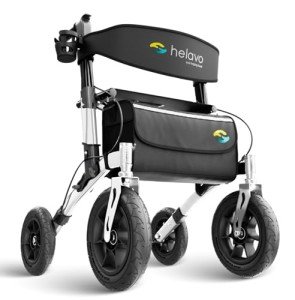The Benefits and Features of Lightweight 4-Wheel Walkers
The aging population and increasing occurrences of mobility-related concerns have actually led to a rise in the demand for mobility aids. Amongst the myriad of alternatives offered, the lightweight 4-wheel walker sticks out as a practical and extremely functional option for those needing assistance with walking. In this post, we will check out the crucial features, benefits, and factors to consider for buying a lightweight 4-wheel walker, supplying an extensive overview that caters to diverse needs and choices.
Comprehending Lightweight 4-Wheel Walkers
A lightweight 4-wheel walker is created primarily for people who require some support while walking. Unlike standard walkers, these modern devices provide boosted independence and mobility, allowing users to browse numerous environments. They are geared up with four wheels, a durable frame, and generally include features such as hand brakes, a seat, and storage compartments.
Secret Features of Lightweight 4-Wheel Walkers
| Feature | Description |
|---|---|
| Weight | Typically weighs between 10 to 20 pounds, making it easy to raise and transport. |
| Frame Material | Typically made from aluminum or lightweight steel for strength without included bulk. |
| Wheels | Big, durable wheels developed for smooth movement on numerous terrains. |
| Brakes | Hand-operated brakes provide the ability to stop easily when seated or while walking. |
| Adjustable Height | The height can typically be changed to accommodate different user heights. |
| Storage | Many walkers featured built-in storage options such as baskets or a seat with a pouch. |
| Foldability | Easily folds for compact storage and transport, hassle-free for travel. |
Advantages of Using a Lightweight 4-Wheel Walker
- Improved Mobility: Lightweight 4-wheel walkers are designed to promote self-reliance, permitting users to walk further and explore their environment without the fear of falling.
- Stability and Support: With their robust design, these walkers offer included stability and support, particularly for people with balance concerns or those recuperating from surgical treatment.
- Portability: Their lightweight nature makes them easy to carry or keep, perfect for active people needing a mobility aid that will not weigh them down.
- Convenience Features: Many models include comfortable seats, permitting users to take breaks as required, boosting their capability to engage in day-to-day activities or social interactions.
- User-Friendly Design: The easy operation of brakes and steering makes these walkers easy to use, even for those with minimal mastery or strength.
Considerations When Purchasing a Lightweight 4-Wheel Walker
| Aspect | Considerations |
|---|---|
| Weight Capacity | Ensure the walker can support your weight securely. |
| Size and Dimensions | Pick a model that suits your height and width choices. |
| Terrain Compatibility | Assess the environments in which the walker will be used; appearance for bigger wheels for outdoor or uneven terrain. |
| Extra Features | Consider options for adjustable handles, built-in lighting, cup holders, and other features that boost functionality. |
| Price Point | Evaluation your spending plan while keeping in mind that extra features or higher-quality materials might come at a premium. |
FAQs About Lightweight 4-Wheel Walkers
What is the distinction between a walker and a rollator walker?
A standard walker normally does not have wheels and must be raised. In contrast, a rollator walker (typically referred to as a 4-wheel walker) has wheels and permits for forward motion without lifting, promoting a more natural walking movement.
Are lightweight 4-wheel walkers appropriate for outdoor use?
Yes, numerous lightweight 4-wheel walkers are designed for outdoor usage with bigger wheels and enhanced frames. Nevertheless, it is important to look for specifications designed to manage rugged terrain.
Can a lightweight 4-wheel walker be used for high individuals?
A lot of lightweight 4-wheel walkers feature adjustable height features that accommodate a series of user heights. It's vital to choose a model that can extend to your convenience level.
How do I preserve my lightweight 4-wheel walker?
Routine maintenance includes inspecting the brakes, cleaning the wheels, and examining the frame for any wear and tear. It is advisable to describe the user handbook for specific care standards.
Exist any weight limits on lightweight 4-wheel walkers?
Yes, each walker has actually a defined weight capability, so it is necessary to choose one that safely supports your weight and activity level.
Picking the Right Lightweight 4-Wheel Walker
Picking a lightweight 4-wheel walker can boost lifestyle by promoting flexibility of movement. Below are some steps to help in making the ideal choice:
- Evaluate Needs: Consider personal mobility obstacles, including height, weight, and typical usage situations.
- Research study Options: Look into various brands and models, checking evaluations and scores to find walkers that meet your particular needs.
- Test Walkers: If possible, test different walkers to discover one that feels comfortable and stable.
- Consult Professionals: Discuss choices with a doctor, physiotherapist, or physical therapist to get tailored suggestions based on case history.
- Think About Extra Features: Think about extra benefits that may make daily use simpler, such as a seat, storage basket, or incorporated lighting.
Lightweight 4-wheel walkers play an important role in supporting enhanced mobility and self-reliance for people with walking difficulties. By considering Bariatric Rollator Walker , benefits, and specific requirements, users can select the right walker to boost their every day life. With their user-friendly styles and mobility, these walkers are not simply a useful solution; they are a gateway to a more active and fulfilling lifestyle. As the aging population continues to grow, the value of meaningful mobility options like lightweight 4-wheel walkers will just end up being more obvious.

